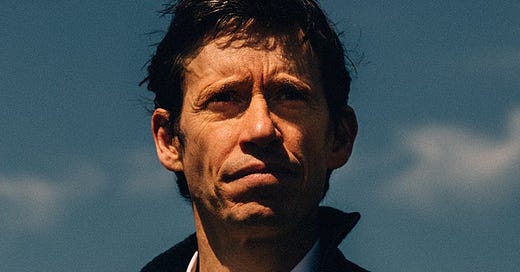The SR Feature: Who is this man?
Rory Stewart still doesn’t know who he is.
Good evening. Welcome to the latest Saturday Read Feature. This is Harry.
Who is Rory Stewart? Will has written the definitive piece after travelling with him this summer. The politician-turned-podcaster, he reveals over 4,800 words, is paying the price for his illusions. It’s a superb read.
The piece begins below. Click through to read it in full. (If you would just like to receive the main email you can adjust your settings by clicking through to Substack.)
Late in the Seventies, Rory Stewart was taken by his godfather, the journalist John Tusa, to the Royal Albert Hall. On show that day was a Chinese acrobatic troupe. They performed scarcely credible physical stunts, balancing acts, dances. The six-year-old Stewart turned to Tusa and said: “I can do that.”
In the 44 years since, Stewart, a politician, traveller and writer, has done just about everything – short of becoming a Chinese acrobat, or the prime minister. His life is more compellingly patterned, more theatrically retold, and perhaps more consciously shaped than any other in our public life.
Stewart has a new book out – a political memoir – but he has been working on the record of his life for years. A Wikipedia account, Chezza88 – named after a bulldog his mother owned – was set up in 2016 to write an entry for his father, Brian, a soldier, colonial officer and, between 1974 and 1979, the second-most powerful man in MI6.
In September 2020, almost a year to the day that he lost the whip along with 20 other Conservative MPs, Chezza88 turned to his own entry, which was updated for the next two years. Details were clarified. The history and seniority of Rory Stewart’s government roles became more pronounced. A section on his podcast, The Rest is Politics, appeared.
When I emailed Stewart about the account, after spending a significant time with him in September for this profile, he replied: “That account has sometimes been used by me – I wrote my father’s entry – and inserted recent stuff about Rest Is Politics – it was however also heavily used by parliamentary office, leadership and London Campaign teams (and also at one point by mother!).”
Stewart quit the Conservative Party on 3 October 2019. He announced his candidacy for the London mayoralty the next day. That campaign ended on 6 May 2020, when Stewart withdrew due to the constraints imposed on him by the Covid-19 pandemic. The editing of his Wikipedia page began four months later.
When we spoke on the phone he wanted to clarify that the account had not been doing anything mischievous. He sounded a bit rattled: “I hope there’s nothing really weird or horrible there.” There wasn’t – but the details appeared to contradict the version of the story Stewart had emailed me. He no longer had an MP’s staff when Chezza88 began editing his page.
At Eton Rory Stewart was felt to be exotic, unembarrassable and ambitious even by the school’s infinite standards. Stephen Brown, a playwright who has known him since childhood, said that “older boys were not very nice to him”. Another Eton friend, the academic Edward Skidelsky, remembers a “somewhat ridiculous character, very flamboyant”. If Stewart was bullied it seems to have had little effect on him. Stewart told me that he had “no teenage angst”. He wondered if he even had a soul.
Most Eton boys, like the literary critic James Wood, understood as they left the school that, as Wood wrote in 2019, “if we weren’t exactly managing decline, we would certainly not be pioneers of expansion. We inhabited a different world from that of our parents and grandparents.” But the teenage Stewart had no conception of decline. Instead he made up his mind to be a giant.
John Tusa remembers his godson walking around his house in the holidays, “reading from great 19th-century political speeches” – practising for the future. Stewart told me that as a young man he had “prepared himself to do something completely astonishing, something that people would talk about for hundreds of years afterwards”. Anything less than greatness seemed unthinkable; in the end, Stewart was an MP for just short of a decade, and a cabinet minister for three months.
Have a good week, and catch you on Saturday for the main email. Thank you.









A very interesting article. He’s right about parliament though. Full of mediocrities on the back benches, and despised by the executive. Look at Sunak waiting until the recess before announcing his break with the net zero consensus, and the Speaker bloviating his protest.
Stewart is right about the need for electoral reform.
Western governance is heavily steered and therefore disadvantaged by corporate interests, sometimes through economic intimidation. Meanwhile, the biggest of businesses are getting unaccountably even bigger, defying the very spirit of government rules established to ensure healthy competition by limiting conglomeration. ...
As it is, in Canada corporate lobbyists are known to write bills for our governing representatives to vote for and have implemented, supposedly to save the elected officials their own time writing them up. I believe the practice has become so systematic here that it seems those who are aware of it, including mainstream news-media political writers, don’t find reason to publicly discuss or write about it.
Nations like China, on the other hand, govern while maintaining control over its own industry/business sector thus market, which may give it an overall trade/relations edge over Western countries.
Anyone who doubts the potent persuasion of huge business interests here in the West need to consider how high-level elected officials can become crippled by implicit/explicit threats to transfer or eliminate jobs and capital investment, thus economic stability, if corporate ‘requests’ aren’t met.